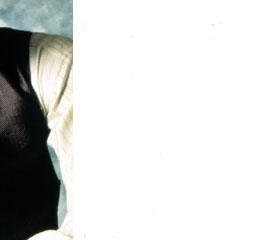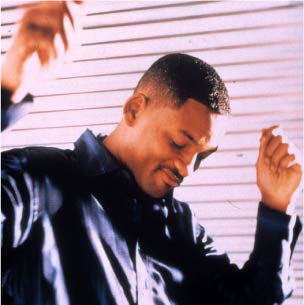



 |
 |
 |
 |
Smith is portraying the great boxing champ on the big screen. And the role of a lifetime is widely expected to turn Smith into the globe's most widely known movie star. "It's the story I was born to make," says Smith, who's been pumping iron for 12 weeks to copy Ali's muscular frame and training with a boxing coach to duplicate the champ's flamboyant ring style. "This is a dream come true." Shooting on The Greatest just began. Smith, who's taking home $20 million for his labor of love, has already added 22 pounds of muscle on his 6 ft. 2 in. frame. "I'm sparring in the ring two hours a day, scaring the director to death," says the engaging 32-year-old actor. "He's afraid someone will clip me hard and mark up my face. But let's face it - I never was as pretty as Muhammad." The director, Michael Mann, is away in Africa as Smith speaks. Having already chosen shooting locations in Los Angeles and New York, Mann is scouting areas for scenes in which Ali takes on George Foreman in his Rumble in the Jungle. The Greatest, scheduled for worldwide release next summer, will be rising star Smith's most ambitious film. Although it deals with Ali's early years as Cassius Clay, growing up in Lexington, Kentucky, and developing into an Olympic medal winner, the movie also tackles Ali's fierce battles against racism in the United States. "I'm excited about the challenge," says Smith, who's never before taken on the mantle of civil rights exponent in any of his movies. "This is the way it was, and this is the way we'll show it. Besides, Ali wants me to do it. When he wants you to do it, then it's like, 'OK.' " Smith didn't always feel that way. "I turned down the role eight times," he admits. "I was just too much in awe of Ali to play him. How's anyone going to play the greatest performer of all time? But then he personally called me. He actually asked me to do it. I could say no to myself - but not to him. If he thinks I can do it, that's good enough for me." While he's putting in gym time to bulk up, Smith is also composing the musical score for The Greatest. A rap star before he got into TV and the movies, he is working on the score in the small recording studio of his suburban Los Angeles home. He relaxes there at his own golf course and at the kidney-shaped pool with his wife, actress Jada Pinkett Smith, their two-year-old son, Jaden, and Trey, the seven-year-old son from his first marriage to Sheree Zampino. Smith and his wife recently added a daughter, Willow, to their growing family. The couple married at the end of 1997, on New Year's Eve, after a long courtship. Smith credits his wife with keeping him level-headed despite his $20-million fee and army of teen fans. "I focus on my relationship with Jada like a soldier," he says. "You've got to work at it. When we're together, I'm her mate, I'm her security guard, I'm her cook. I'm everything. "I get turned on by working 16 hours, then completely drained coming in the house and taking the kids for an hour from her - that makes me feel strong. You have to focus on everything in your life with that type of military intensity. "I have to tell you, Jada is completely real. She's uncomfortable with the press and the attention. She's always reminding me by example that life is really the most important thing, and how a big movie, and all of that, is fun. You can enjoy that, and Hollywood premieres, but your life and your family is what's really important." Most importantly, he lets her know who the boss is. Jada. "Families are like a business, and the key is one person having a vision of what it needs to be and being able to pull everyone together and make it work," he says. "It was always my mom, and my grandmom before her. Women are actually in charge of everything. The game of chess is the perfect example, where the king is kind of the figurehead but the queen is the most powerful piece on the board. Life is not unlike that." Growing up in a hard-working, middle-class Philadelphia family, Smith was exceptional yet always likeable. "I was one of those kids who never did drugs or anything," he says. "But I had friends who would mess with drugs. And like I was so silly that my friends were like, 'No, man, you don't need this. Stay away from this, man. Ain't no telling what might happen to you.' " He stayed clean - probably, he thinks, because he was closely supervised by his parents. "My folks planned 'strategic wins' for all the children, things that looked impossible that we were forced to do," he says, tongue halfway in cheek. "My father is one of these guys who would do everything himself. He wouldn't call a plumber, or even a dentist. You'd say, 'Oh, Dad, I got a toothache.' He'd say, 'Oh, boy, go out to the truck and get my toolbox.' "He owned his own refrigeration and electrical business. One year, he tore the front off the building, and my brother and I actually had to mix concrete by hand, then lay the bricks one at a time. "The wall was probably 50 feet wide and 16 feet high. We thought it was impossible. I remember the day it was finished. We stood there and my father said, 'Don't you ever tell me there's something you can't do.' "In my mind, it was instilled anything that you ever want to do, you do it one brick at a time. You can't not finish." The first thing he did was to become a rap star. Called "Prince" by his teachers - he added "Fresh" on his own. Smith teamed up at age 12 with Jeff Townes at a party and began performing with him as DJ Jazzy Jeff and The Fresh Prince. The pair made a million while still teens. In 1989, he gave his name to a fish-out-of-water TV comedy series, The Fresh Prince of Bel-Air. It ran successfully for six years. Smith made his film debut in Six Degrees of Separation, leading up to his box-office hits Independence Day and Men in Black. Is being a black man in Hollywood a career barrier? Smith rejects that notion: "It's not any more of a hindrance than it is doing anything else. Racism is an unfortunate part of American culture. It's something you don't accept but something you know is going to exist. I don't have any fear for it. "I'm a firm believer that the smartest person wins. When I sit in meetings in Hollywood dealing with directors, producers, executives, they need me. Even before they knew they needed me, I knew they needed me. "You will never hear me say some white man owes me something because of slavery. I'm not giving that kind of credit." His director in Men in Black, Barry Sonnenfeld, has suggested Smith's popularity owes a great deal to his personal charm. White audiences find him non-threatening. "I don't know about that, man!" says Smith, with a laugh. "The bottom line with me is fun. I don't like stress. "People have so much stress in their lives that it's kind of a breath of fresh air to just sit for an hour and a half and watch a movie of somebody who's just having fun. I enjoy life, I enjoy people. And people - black, white, Asian or alien - enjoy that energy."  Smith's own energy seems boundless. Already in the can is the movie Smith
has made under the direction of Robert Redford. The recently opened The
Legend of Bagger Vance is about caddy Bagger Vance (Smith), who
teaches Matt Damon how to obtain golf greatness.
Smith's own energy seems boundless. Already in the can is the movie Smith
has made under the direction of Robert Redford. The recently opened The
Legend of Bagger Vance is about caddy Bagger Vance (Smith), who
teaches Matt Damon how to obtain golf greatness.Damon finds the struggle futile until Smith teaches him the secret of the authentic golf stroke, which turns out also to be the secret to mastering any challenge and finding meaning in life. After The Greatest, Smith is slated to make a sequel to Men in Black and then take on Kind Hearts and Coronets. - Joan Krzys |